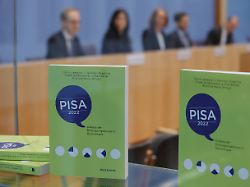Education soon also a federal matter?
PISA shock could change the constitution
December 8th, 2023, 7:15 p.m
In Germany, education is a state matter. Still. Education Minister Stark-Watzinger is pushing for a change to the Basic Law. This could give the federal government more rights to act. After the shock of the devastating results of the PISA study, quick action is required.
In response to the poor results of German students in the most recent PISA study, Federal Education Minister Bettina Stark-Watzinger has discussed changing the Basic Law. “I would like the Basic Law to allow us to work together between the federal government and some of the federal states, I call it a coalition of the willing. This way we could initiate projects more quickly,” said the FDP politician in the “Frankfurter Allgemeine Sonntagszeitung”. “We have to be able to act faster to organize education well. PISA shows that time is of the essence,” warned the minister.
According to the Basic Law, school education in Germany is the responsibility of the federal states. The federal government can provide support with funding programs such as the Digital Pact, but to do so it has to negotiate costly contracts with the states. Stark-Watzinger also suggested shifting responsibility for daycare centers from the family ministries to the education departments. “Daycare centers are educational institutions. For me, they belong in the ministries of education,” she emphasized. “We urgently need to improve the transition.”
There also needs to be an open debate about education policy in a country of immigration, emphasized Stark-Watzinger. “It doesn’t help anyone to make this topic taboo or to put it in a populist corner. We have to provide targeted support. So, above all, support where it is most urgently needed. Where there is no bookcase at home or sufficient German is spoken.” This is where the StartChances program comes in, which is intended to particularly strengthen around 4,000 schools with a high proportion of socially disadvantaged students from the next school year. “We need to work on language skills and do so as early as possible,” warned Stark-Watzinger.
In the study published on Tuesday, German 15/16-year-olds achieved the weakest performance values in reading, mathematics and natural sciences that were ever measured for Germany as part of PISA. Even in international comparison, learning performance has never been as bad. The main causes are the corona pandemic and an increasing proportion of students whose native language is not German.
